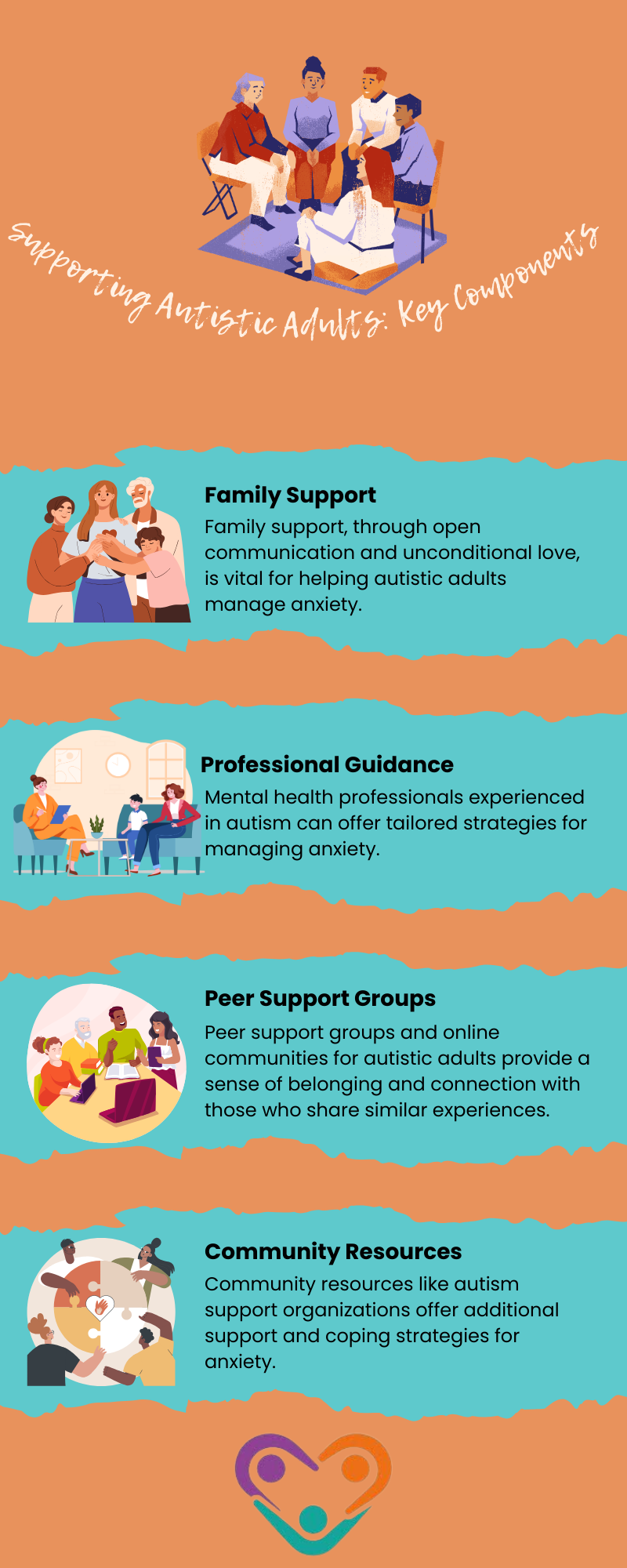
Table of Contents
Anxiety is a common experience for many adults, but for those with autism, it can be especially challenging. The unique way autistic adults perceive and interact with the world can lead to heightened feelings of stress and worry.
Understanding how anxiety manifests in autistic adults is essential for providing the right support and care. Whether it’s social situations, changes in routine, or sensory overload, these triggers can make daily life feel overwhelming.
Recognizing the signs and knowing how to manage anxiety can make a significant difference in the well-being of autistic adults.
High Rates of Anxiety in Autistic Adults
Generalized anxiety disorder stands out as one of the most common comorbid conditions in adults with autism.
Research shows that anxiety disorders are diagnosed in 20.1% of autistic adults, compared to a significantly lower rate of just 8.7% in neurotypical adults. The heightened susceptibility to anxiety in autistic adults underscores the importance of recognizing and addressing anxiety symptoms in this population.
Untreated anxiety in individuals with autism can lead to various adverse outcomes, including the development of conditions such as depression, aggression, and self-injury. It is crucial to diagnose and treat anxiety in autistic individuals effectively to mitigate the risk of these serious consequences and enhance their overall well-being.
When assessing anxiety in adults with autism, healthcare providers should pay particular attention to physical manifestations of anxiety, such as tremors, restlessness, sweating, body aches, and sleep disturbances.
These observable signs can provide valuable insights into the presence of anxiety, especially since standard diagnostic questionnaires may not capture anxiety accurately in individuals with ASD.
Impact of Untreated Anxiety in Autistic Adults
Untreated anxiety in autistic adults can have profound consequences on their mental and emotional well-being. Failure to address and manage anxiety effectively can lead to a range of risks and challenges that significantly impact the individual’s quality of life.
Untreated or inadequately treated anxiety in autistic adults can exacerbate existing symptoms and pose various risks, including:
- Development of depression
- Increased aggression
- Self-harm behaviors
The correlation between untreated anxiety and these risks underscores the critical need to prioritize the identification and management of anxiety in individuals on the autism spectrum. Addressing anxiety proactively and providing appropriate support and interventions, these risks can be mitigated can help enhance the individual’s overall well-being and quality of life.
Recognizing the signs of anxiety in adults with autism and taking proactive steps to address and manage it is essential in promoting positive mental health outcomes and improving the individual’s ability to navigate daily challenges effectively.
Through a holistic approach that integrates tailored treatment strategies and ongoing support, individuals with autism can better cope with anxiety and lead fulfilling lives.

Approaches to Treating Anxiety
A comprehensive approach to treatment is essential for supporting the mental well-being of autistic adults. Fortunately, there are several strategies and interventions available that can help manage anxiety in individuals on the autism spectrum.
Let’s look at each of them.
Cognitive Behavioral Therapy (CBT)
Cognitive Behavioral Therapy (CBT) is a widely used form of psychotherapy that focuses on identifying negative thought patterns and restructuring them to develop more adaptive behaviors. While cognitive behavioral therapy is a popular treatment for anxiety in the general population, it may need to be adapted for individuals with autism.
Many autistic individuals have found CBT beneficial in addressing anxiety and improving coping mechanisms.
Alternative Augmentative Communication (AAC)
Alternative Augmentative Communication (AAC) encompasses a range of communication methods that can support individuals with challenges in verbal expression, a common trait among those with autism.
AAC includes both unaided communication methods like sign language and aided communication methods such as tablet-based communication devices. These tools can be invaluable for individuals with autism who experience difficulty in verbal communication, which can be a significant source of anxiety.

Medication Options
In some cases, medication may be considered as part of the treatment plan for anxiety in adults with autism.
Medications such as Luvox and fluoxetine (Prozac) have shown effectiveness in managing obsessive-compulsive behaviors and anxiety in this population. However, it is essential to note that the response to medications and potential side effects can vary significantly among adults with autism spectrum disorder.
Therefore, it is crucial for the treatment approach to be individualized, closely monitored, and adjusted based on the individual’s unique needs and responses.
Utilizing a combination of these approaches, tailored to the specific needs of the individual with autism, can help effectively manage anxiety and enhance their overall quality of life. Working collaboratively with healthcare professionals and incorporating a holistic treatment plan can yield positive outcomes in supporting individuals with autism in addressing their anxiety concerns.
How to Manage Anxiety in Daily Life
Effectively managing anxiety in daily life is crucial for enhancing the well-being of individuals with autism. Coping strategies and support networks play a vital role in helping autistic adults navigate the challenges posed by anxiety.
Building strong support networks is essential for providing emotional and practical assistance to autistic adults facing anxiety. Support networks can consist of family members, friends, healthcare professionals, and community resources that offer guidance and understanding.
Some key components of support networks for autistic adults dealing with anxiety include:

Fostering strong support networks helps autistic adults feel more empowered to address their anxiety challenges and access the help they need to navigate daily life effectively.
At the same time, autistic adults often experience heightened levels of anxiety, which can manifest in various ways, including worrying about everyday events and persistent fears. It’s essential to equip individuals with autism with coping strategies to manage their anxiety effectively.
Here are some effective coping strategies that can help them manage anxiety in daily life:
- Deep Breathing Exercises: Encouraging deep breathing techniques can help individuals regulate their emotions and reduce feelings of anxiety.
- Sensory Support: Providing sensory tools like fidget toys or weighted blankets can offer comfort and a sense of security during anxious moments.
- Routine and Structure: Establishing a predictable routine can provide a sense of stability and reduce uncertainty, which may contribute to anxiety.
- Mindfulness and Relaxation Techniques: Practicing mindfulness and relaxation exercises can help individuals stay present and minimize anxious thoughts.
- Social Support: Encouraging open communication and discussing feelings of anxiety with trusted individuals can offer emotional support.
Incorporating these coping strategies into daily life allows autistic adults to better manage their anxiety and enhance their overall well-being.
Understanding the connection between autism and anxiety in adults is key to providing the right support and finding effective coping strategies. By recognizing the unique challenges that come with this dual diagnosis, we can create a more compassionate and inclusive environment for those who live with it.
Remember, awareness and understanding are the first steps toward making a positive difference in someone’s life.
With the right tools and support, managing anxiety alongside autism becomes not just possible, but achievable. For those seeking specialized care, Golden Care Therapy offers ABA programs in NJ, Indiana, Georgia, and New York. Contact us today to find out how they can help you or your loved one on this journey.
Sources:
- Autism and Feeling Empty: What’s the Connection? - September 19, 2024
- Addressing Autism and Anger Issues - September 19, 2024
- Embracing Autism and Self-Acceptance in Daily Life - September 19, 2024
